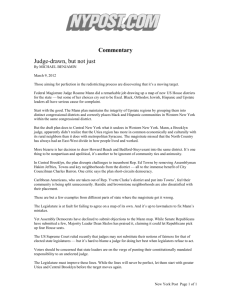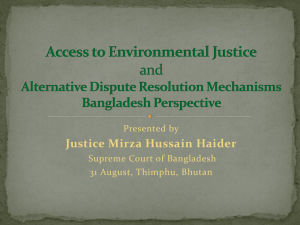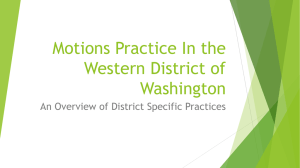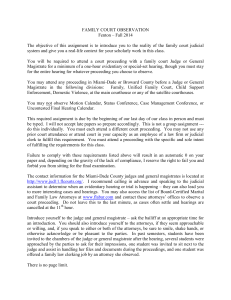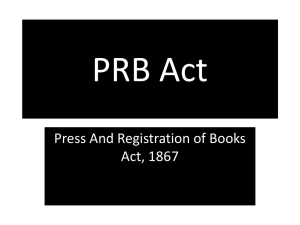AFI51-905
advertisement
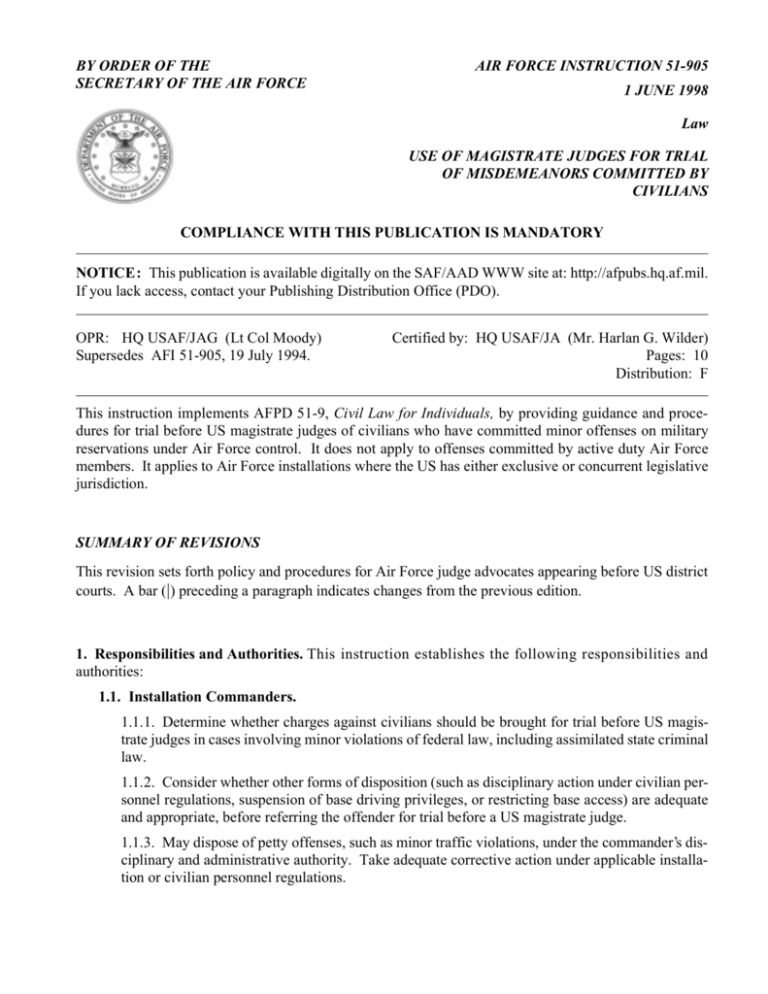
BY ORDER OF THE SECRETARY OF THE AIR FORCE AIR FORCE INSTRUCTION 51-905 1 JUNE 1998 Law USE OF MAGISTRATE JUDGES FOR TRIAL OF MISDEMEANORS COMMITTED BY CIVILIANS COMPLIANCE WITH THIS PUBLICATION IS MANDATORY NOTICE: This publication is available digitally on the SAF/AAD WWW site at: http://afpubs.hq.af.mil. If you lack access, contact your Publishing Distribution Office (PDO). OPR: HQ USAF/JAG (Lt Col Moody) Supersedes AFI 51-905, 19 July 1994. Certified by: HQ USAF/JA (Mr. Harlan G. Wilder) Pages: 10 Distribution: F This instruction implements AFPD 51-9, Civil Law for Individuals, by providing guidance and procedures for trial before US magistrate judges of civilians who have committed minor offenses on military reservations under Air Force control. It does not apply to offenses committed by active duty Air Force members. It applies to Air Force installations where the US has either exclusive or concurrent legislative jurisdiction. SUMMARY OF REVISIONS This revision sets forth policy and procedures for Air Force judge advocates appearing before US district courts. A bar (|) preceding a paragraph indicates changes from the previous edition. 1. Responsibilities and Authorities. This instruction establishes the following responsibilities and authorities: 1.1. Installation Commanders. 1.1.1. Determine whether charges against civilians should be brought for trial before US magistrate judges in cases involving minor violations of federal law, including assimilated state criminal law. 1.1.2. Consider whether other forms of disposition (such as disciplinary action under civilian personnel regulations, suspension of base driving privileges, or restricting base access) are adequate and appropriate, before referring the offender for trial before a US magistrate judge. 1.1.3. May dispose of petty offenses, such as minor traffic violations, under the commander’s disciplinary and administrative authority. Take adequate corrective action under applicable installation or civilian personnel regulations. 2 AFI51-905 1 JUNE 1998 1.1.4. Deal with Air Force military offenders according to other Air Force instructions and the Uniform Code of Military Justice. 1.1.5. Authorize magistrate court citations only if a violation of base safety, traffic, or protective instructions also constitutes a federal or assimilated state criminal law violation. A violation of a federal regulation promulgated under 40 U.S.C. 318a is a violation of federal law. 1.1.6. For installations located where vehicular and pedestrian traffic laws are decriminalized, or where additional installation traffic rules are needed, promulgate local installation traffic rules under the authority delegated to installation commanders in DoD Directive 5525.4, Enforcement of State Traffic Laws on DoD Installations, to establish violations of those local rules (which may include the decriminalized state code violations) as violations of 40 U.S.C. 318c. Such rules may subject the violator to a fine of not more than $50 or imprisonment for not more than 30 days, or both, for each violation. A copy of DoD Directive 5525.4 must be posted in a conspicuous place on the installation. (40 U.S.C. 318a, 318c) 1.1.7. May make a blanket determination (based on safety, discipline or other considerations) that administrative disposition of certain offenses committed by civilians on base is not adequate or appropriate and that all such offenses will be referred to a US magistrate judge for trial. Refer all civilian offenders who commit those offenses to the US magistrate judge. 1.1.8. May ask the US attorney for the district to petition the US district court to designate a magistrate judge to try persons who are charged with misdemeanors committed on the installation, if one has not been designated to do so. 1.1.9. Designate an officer, such as the chief of security police or the staff judge advocate, to prepare and file misdemeanor (other than petty offense) complaints with the US magistrate judge. 1.1.10. Designate an Air Force official to prepare and file petty offense complaints. 1.2. Authority of US Magistrate Judge . A properly designated US magistrate judge: 1.2.1. Can try and sentence persons who commit misdemeanors in places under the exclusive or concurrent jurisdiction of the United States and in the judicial district for which such magistrate judge is appointed (18 U.S.C. 3401[a]). 1.2.2. Can issue a warrant of arrest, based on a properly filed complaint. 1.2.3. Cannot try persons for violating Air Force or installation instructions, as such, unless they are promulgated under the authority delegated by the Office of the Secretary of Defense to installation commanders in DoD Directive 5525.4 as violations of 40 U.S.C. 318c. 1.3. Authority to Prosecute. The US attorney has prosecutorial authority in cases covered by this instruction. The US attorney for the judicial district in which the installation is located may advise that a representative of the Department of Justice is not available to conduct the prosecutions before US magistrate judges. In this case, installation staff judge advocates may appoint judge advocates as special assistant US attorneys to conduct such prosecutions. 1.4. Trial in US District Court . If the defendant elects to be tried before the US district court, the installation staff judge advocate must first obtain approval before a judge advocate may prosecute the case. This is true even if the judge advocate has been authorized to prosecute in that case before a US AFI51-905 1 JUNE 1998 3 magistrate judge. The appropriate US Attorney must first request the Air Force to conduct the prosecution in US district court. The installation staff judge advocate must then secure the permission of The Judge Advocate General, through appropriate command channels, to conduct the prosecution in US district court. Such approval is granted only on a case-by-case basis. Requests for approval should be forwarded to HQ USAF/JAG. 2. Procedures Established by This Instruction: 2.1. Complaints. The designated officer (see 1.1.1) prepares a complaint in the format prescribed by the local US magistrate judge. Attachment 4 is a suggested format. The office of the staff judge advocate must review a complaint prepared by another office prior to filing. 2.1.1. DD Form 1805, Violation Notice, is not a complaint as that term is used here. Use DD Form 1805 to refer petty offenses committed by civilians on base to the US magistrate judge. A DD Form 1805 issued by the security forces does not require review by the office of the staff judge advocate. 2.2. Warrants. When a US magistrate judge issues a warrant of arrest, US marshals or their deputies will usually execute such warrants. Under no circumstances will Air Force personnel execute such warrants. 2.3. Trial. Any person charged with a misdemeanor may elect trial before the US district court for the district in which the offenses were committed. The US magistrate judge must inform the defendant of the right to make this choice and may not try the case until the defendant is notified and signs a written consent to be tried by the US magistrate judge. (18 U.S.C. 3401[b]). 2.3.1. Prepare the written consent in the format prescribed by the local magistrate judge. Attachment 2 and Attachment 3 show suggested formats. Attachment 2 is for petty offense cases in which the offender has no right to trial by jury. You may use Attachment 3 in all other misdemeanor cases (including petty offense cases) in which the right to a jury trial is prescribed by law. 2.4. In all cases of conviction by a US magistrate judge, the defendant may appeal to the US district court for the district in which the offense was committed (18 U.S.C. 3402). 2.5. The rules volume of Title 18, United States Code, sets forth the rules for trying cases before US magistrate judges and for appealing to US district court. The US Supreme Court has set these rules. BRYAN G. HAWLEY, Maj General, USAF The Judge Advocate General 4 AFI51-905 1 JUNE 1998 Attachment 1 GLOSSARY OF REFERENCES AND SUPPORTING INFORMATION Terms Misdemeanor.—An offense for which the authorized penalty does not exceed imprisonment for one year. Misdemeanors may include violations of assimilated state criminal laws that apply to a federal reservation pursuant to 18 U.S.C. 13. Petty Offense.—A misdemeanor for which the authorized penalty does not exceed imprisonment for six months or a fine of $500, or both. This includes local installation traffic rules promulgated under the authority delegated to installation commanders in DoD Directive 5524.4, as violations of 40 U.S.C. 318c. AFI51-905 1 JUNE 1998 5 Attachment 2 SAMPLE CONSENT DOCUMENT (PETTY OFFENSES) UNITED STATES DISTRICT COURT FOR THE UNITED STATES OF AMERICA V. Docket No. ___________________________ CONSENT TO PROCEED BEFORE UNITED STATES MAGISTRATE JUDGE IN A PETTY OFFENSE CASE The United States magistrate judge has explained to me the nature of the offense(s) with which I am charged and the maximum possible penalties which might be imposed if I am found guilty. The magistrate has informed me of my right to the assistance of legal counsel. The magistrate judge has informed me of my right to trial, judgment and sentencing before a United States district court judge. The magistrate judge has also advised me of my right to have at least thirty days to prepare for trial before the magistrate judge. I HEREBY: Waive (give up) my right to trial, judgment and sentencing before a United States district court judge, and I consent to trial, judgment and sentencing before a United States magistrate judge; and Waive (give up) my right to have at least thirty days to prepare for trial.* __________________________________ Defendant 6 AFI51-905 1 JUNE 1998 Date Before United States Magistrate Judge __________________________________ Defendant’s Attorney (if any) *The defendant need not waive this right in order to be tried by the magistrate judge. Accordingly, strike this sentence if the defendant wishes to have at least thirty days to prepare for trial. AFI51-905 1 JUNE 1998 7 Attachment 3 SAMPLE CONSENT DOCUMENT (Misdemeanors) UNITED STATES DISTRICT COURT FOR THE UNITED STATES OF AMERICA V. Docket No. _____________________ CONSENT TO PROCEED BEFORE UNITED STATES MAGISTRATE JUDGE IN A MISDEMEANOR CASE The United States magistrate judge has explained to me the nature of the offense(s) with which I am charged and the maximum possible penalties which might be imposed if I am found guilty. The magistrate has informed me of my right to the assistance of legal counsel. The magistrate judge has also informed me of my right to trial, judgment and sentencing before a United States district court judge. I HEREBY: Waive (give up) my right to trial, judgment and sentencing before a United States district court judge and I consent to trial, judgment and sentencing before a United States magistrate judge. ____________________________ Defendant WAIVER OF RIGHT TO TRIAL BY JURY The magistrate judge has advised me of my right to trial by jury before either a United States district court judge or a United States magistrate judge. 8 AFI51-905 1 JUNE 1998 I HEREBY: Waive (give up) my right to trial by jury. ________________________________ Defendant WAIVER OF RIGHT TO HAVE THIRTY DAYS TO PREPARE FOR TRIAL The magistrate has also advised me of my right to have at least thirty days to prepare for trial before the magistrate judge. ________________________________ Defendant Date Before United States Magistrate Judge ________________________________ Defendant’s Attorney (if any) AFI51-905 1 JUNE 1998 9 Attachment 4 SAMPLE COMPLAINT UNITED STATES DISTRICT COURT FOR THE Magistrate Judge’s Docket No. Case No. UNITED STATES OF AMERICA COMPLAINT for VIOLATION of V. U.S.C. Title Section BEFORE _______________________________ _______________________________ Name of Magistrate Judge Address of Magistrate Judge The undersigned complainant being duly sworn states: That on or about 19 at in the District of (1) ______________________________________________ did (2) ___________________________________________ And the complainant states that this complaint is based on _________________________________________________ 10 AFI51-905 1 JUNE 1998 And the complainant further states that (he) (she) believes that __________________________________________________ are material witnesses in relation to this charge. ____________________________________ Signature of Complainant __________________________________ Official title Sworn to before me, and subscribed in my presence, 19 . _____________________________________ United States Magistrate Judge (1) Insert name of accused. (2) Insert statement of the essential facts constituting the offense charged.
